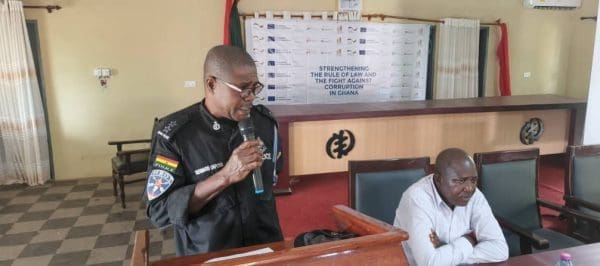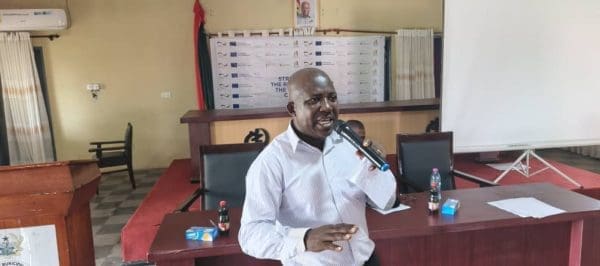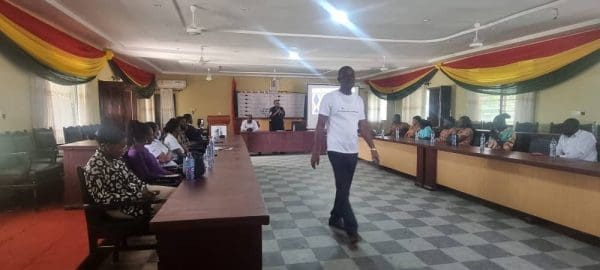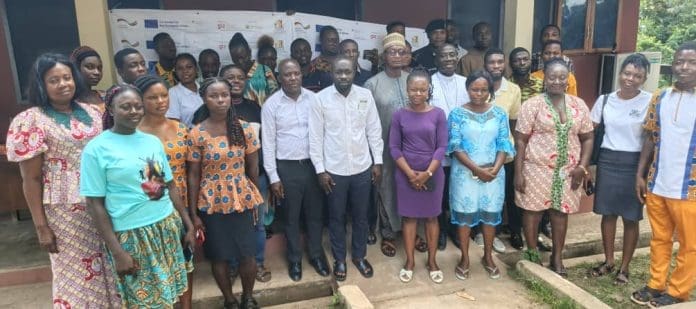The National Commission for Civic Education held an educational workshop on “Civic Engagements on the Rule of Law and the Fight Against Corruption” at the Sefwi Wiawso Municipal Assembly Hall in the Western North Region on 11th September 2025.
The event aimed to empower young people with practical knowledge on the Rule of Law, Civic Rights, Legal Frameworks such as the Whistleblower Act, and their role in promoting transparency and accountability.
Participants were expected to develop the ability to speak out against wrongdoing without fear of retaliation, while fostering a sense of civic duty and responsibility.
The program also creates opportunities for redress in case of human rights violations, such as the PRCC-Municipal Assembly, Legal Aid Department, CHRAJ, among others.
The participants took turns to respond to questions and contributed various suggestions to demonstrate their understanding of the concept of corruption and the ways to address matters related to it.
Facilitators took the participants through some topics, such as corruption impacts and risk management.
The participants, mainly out-of-school youth between the ages of 18 and 35 years, comprising 30 males and 20 females, expressed appreciation to the NCCE for organising the knowledge-rich workshop.
Three facilitators, ASP Bernard Okpora, District Police Commander, Bernard Owusu Afriyie, Western North Regional Director of Commission on Human Rights and Administrative Justice (CHRAJ), and Laud Swanzy, Sefwi Wiawso Municipal Director of NCCE, mentored the young people.

ASP Bernard Okpora treated the Whistleblowers Act [Act 720 of 2006], which seeks to empower individuals to report illegal, unethical, or corrupt conduct in society without fear or favour, adding that the law provides legal protection against negative consequences for whistleblowers and rewards them.
He urged citizens, young and old, to take advantage of the act to minimise the menace of corruption in society. The police commander assured participants, especially members of the Commercial Drivers Union, that his outfit would address harassment of drivers by police officers.

Mr. Bernard Owusu Afriyie led a discussion on the Rule of Law and Anti-Corruption. He noted that there are institutions that are mandated to spearhead the fight against corruption. These institutions are: Police Service, Office of the Special Prosecutor (OSP), Economic and Organised Crime Office (EOCO), National Investigations Bureau (NIB), Commission on Human Rights and Administrative Justice (CHRAJ), Auditor General, among others.
He disclosed that although other institutions have been mandated to lead the corruption fight, the menace cuts across all segments of our society. He, therefore, appealed to all Ghanaians to join hands and eradicate it, saying the government alone cannot fight corruption to its logical conclusion.
Mr. Laud Swanzy noted that Civic Space is the environment that enables citizens to participate in the democratic process, hold leaders accountable, and shape public policy. Hence, taking advantage of it would promote Ghana’s democracy, protect human rights through freedom of expression, assembly, and association.

He said civic space fosters transparency and accountability necessary to fight corruption, building trust in institutions, and promoting social cohesion.
Mr. Swanzy implored the participants to engage in dialogue on nation-building.
He also encouraged citizens whose rights have been violated but lack funds to seek redress to take advantage of existing provisions, such as the Legal Aid, Public Relations and Complaint Centre at the Municipal Assembly, CHRAJ, among others, for assistance.
Source: Laud Swanzy
Source: newsghana.com.gh











